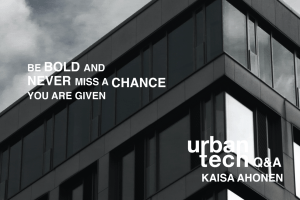Eithne is the Programme Director for the Cambridge Institute for Sustainability Leadership and responsible for the strategic development and delivery of the Accelerator Programme for entrepreneurs and SMEs. The University of Cambridge Institute for Sustainability Leadership (CISL) is a globally influential institute developing leadership and solutions for a sustainable economy.
After co-founding the first Impact Hub in London in 2005, she moved to Cambridge to help ‘green the growth agenda’ on behalf of Cambridge City Council.
Urbantech: Tell us about the barriers you see in the field of sustainable innovation.

Eithne: Diversity is one of the things we really need to pay more attention to in the innovation field. There aren’t enough people who get to contribute and that is crucial if we want really good innovation. Working in a world of accelerators, people are often self-financing in one way or another. That usually means they’ve had a pretty good start in life, but what about those who haven’t? Having worked across the construction, design, and energy sectors throughout the past 10 years, I’ve been in predominantly male working environments. They’re not diverse at all – and that’s just from a gender perspective. It’s not the scapegoat for all of our problems, but a lack of representation should account for at least some of the problems. It’s time to start taking this representation seriously and designing everything to get that level of diversity. We’re constantly asking ourselves ‘how do we best get disruptive thinking?’. One of the ways is to avoid monocultures and ensure we have diverse ecosystems.
Urbantech: How can we better support entrepreneurs working on the green transition?
Eithne: Firstly, it’s important to acknowledge that not everything needs to be a technology solution. Some of the best solutions out there are very simple and aren’t born from years of development in a lab in Cambridge. It’s an implementation challenge for these entrepreneurs. We need to figure out how to help them roll out their solutions whilst protecting their intellectual property. We also need to address access to finance. In my experience, the lighter green ventures tend to win with the investors – even when there is a clear business model and area of impact. I think they feel more comfortable going for digital products and apps which they can easily sell. But if we’re serious about supporting entrepreneurs across the spectrum, then we need to look towards more patient forms of capital. Apps are great but they’re not going to solve the world on their own.
Urbantech: What would you like to hear more – or less of – in the discussion on cities in the future?
Eithne: I’d love to see more of a focus on design rather than tech. A lot of innovation programs for the digital built environment over-emphasise technological aspects such as IoT, sensors, and data. But if COVID-19 has taught us anything, it’s the importance of the design of public spaces in our cities. The crisis has called attention to the massive inequality which exists in countries like the UK. It’s almost reframed access to public space as a fundamental human right. We now realise that it’s not okay for someone to be trapped in a tiny apartment with no access to decent public space. At the same time, the crisis has presented us with an opportunity to jump into action and rectify some of these injustices. New cycle lanes have popped up overnight, and suddenly we’re asking what else can we do overnight that we’ve been told for years and years that we can’t.
Urbantech: How do we move the needle of multi-stakeholder collaboration?
Eithne: I think it’s about picking a partner whose got a very similar interest to you and doing a really good job, rather than getting everyone involved and the concept becoming watered down. Having a wide range of people is very appealing in theory. But in reality, sometimes the best partnerships are hyper-concentrated, well-executed, and then shouted about. It’s about working with the leaders and the prime movers who can offer genuine support on specific focus areas, which in turn creates a ripple effect.
___________________
Connect with Eithne on LinkedIn
Interview by Freya Williams




